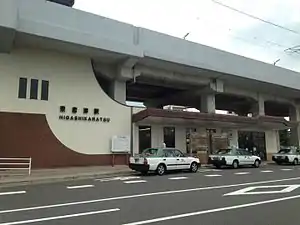Higashi-Karatsu Station
Higashi-Karatsu Station (東唐津駅, Higashi-Karatsu-eki) is a railway station in Karatsu, Saga Prefecture, Japan. It is operated by JR Kyushu and is on the Chikuhi Line.[1][2]
Higashi-Karatsu Station 東唐津駅 | |
|---|---|
 The north entrance of Higashi-Karatsu Station in 2016 | |
| Location | 108-3, Shōnan-chō, Karatsu-shi, Saga-ken Japan |
| Coordinates | 33°26′23″N 129°59′52″E |
| Operated by | |
| Line(s) | ■ Chikuhi Line |
| Distance | 39.3 km from Meinohama |
| Platforms | 1 island platform |
| Tracks | 2 |
| Construction | |
| Structure type | Elevated |
| Bicycle facilities | Bike parking under elevated structure |
| Disabled access | Yes - platforms served by elevators |
| Other information | |
| Status | Staffed ticket window (Midori no Madoguchi) (outsourced) |
| Website | Official website |
| History | |
| Opened | 15 June 1925 |
| Passengers | |
| FY2016 | 823 daily |
| Rank | 188th (among JR Kyushu stations) |
| Location | |
 Higashi-Karatsu Station Location within Japan | |
Lines
The station is served by the Chikuhi Line and is located 39.3 km from the starting point of the line at Meinohama.[3] Rapid and local services on the Chikuhi Line stop at this station.[4]
Station layout
The station consists of an island platform serving two elevated tracks. The station building is located under the elevated structure and has both north and south entrances. It houses a waiting area and a staffed ticket window. The island platform is served by elevators. Parking for bicycles is available under the elevated structure.[3][2]
Management of the station has been outsourced to the JR Kyushu Tetsudou Eigyou Co., a wholly owned subsidiary of JR Kyushu specialising in station services. It staffs the ticket counter which is equipped with a POS machine but does not have a Midori no Madoguchi facility.[5][6]
Gallery
 A distant view of the station with the Matsuura River in the background.
A distant view of the station with the Matsuura River in the background. The south entrance of the station.
The south entrance of the station. A view of the platform and tracks. Note the elevator shaft.
A view of the platform and tracks. Note the elevator shaft.
History
The private Kitakyushu Railway had opened a line between Fukuyoshi and Hamasaki on 5 December 1923. By 1924, the line had been extended westwards to Nijinomatsubara. The line was extended again with Higashi-Karatsu opening on the east bank of the Matsuura River as the new western terminus on 15 June 1925. On 20 June 1929, the track was extended south down the east bank of the Matsuura River towards Yamamoto. Trains at Higashi-Karatsu executed a switchback before proceeding either south to Yamamoto or east to Nijinomatsubara. When the Kitakyushu Railway was nationalized on 1 October 1937, Japanese Government Railways (JGR) took over control of the station. The line which served the station was designated the Chikuhi Line.[7][8][9]
The location of Higashi-Karatsu was inconvenient as the city centre of Karatsu lay on the west bank of the Matsuura River. Passengers wanting to access Karatsu station in the city centre had to travel a long dog-leg south via Yamamoto or make a road or foot journey across the river. In 1983, the station was moved, opening at a new location to the southeast on 22 March. A through-track was established across the Matsuura River via Watada to Karatsu. The stretch of track down the east bank to Yamamoto with the intermediate stations of Kagami and Kuri was closed. Along with this change of route, the track from Meinohama through Higashi-Karatsu to Karatsu was electrified.[9][10][11]
With the privatization of Japanese National Railways (JNR), the successor of JGR, on 1 April 1987, control of the station passed to JR Kyushu.[8]
Passenger statistics
In fiscal 2016, the station was used by an average of 823 passengers daily (boarding passengers only), and it ranked 188th among the busiest stations of JR Kyushu.[12]
Environs
- Karatsu Higashi Police Station
- Karatsu Business College
- Karatsu Royal Hotel
- Saga Prefectural Karatsu Higashi Junior High School & High School
- Karatsu Boat Racing
See also
References
- "JR Kyushu Route Map" (PDF). JR Kyushu. Retrieved 3 March 2018.
- "東唐津" [Higashi-Karatsu]. hacchi-no-he.net. Retrieved 31 March 2018.
- Kawashima, Ryōzō (2013). 図説: 日本の鉄道 四国・九州ライン 全線・全駅・全配線・第5巻 長崎 佐賀 エリア [Japan Railways Illustrated. Shikoku and Kyushu. All lines, all stations, all track layouts. Volume 5 Nagasaki Saga area] (in Japanese). Kodansha. pp. 10, 78. ISBN 9784062951647.
- "東唐津" [Higashi-Karatsu]. JR Kyushu official station website. Retrieved 31 March 2018.
- "福岡支店内各駅" [Stations within the Fukuoka Branch]. JRTE website. Retrieved 31 March 2018.
- "東唐津駅" [Higashi-Karatsu Station]. jr-mars.dyndns.org. Retrieved 31 March 2018. See images of tickets sold.
- Ishino, Tetsu; et al., eds. (1998). 停車場変遷大事典 国鉄・JR編 [Station Transition Directory - JNR/JR] (in Japanese). I. Tokyo: JTB Corporation. pp. 224–5. ISBN 4533029809.
- Ishino, Tetsu; et al., eds. (1998). 停車場変遷大事典 国鉄・JR編 [Station Transition Directory - JNR/JR] (in Japanese). II. Tokyo: JTB Corporation. p. 725. ISBN 4533029809.
- JR Kyushu (2013). JR九州のひみつ [Secrets of JR Kyushu] (in Japanese). PHP Institute, Inc. pp. 82–83. ISBN 9784569814933.
- Imao, Keisuke (2009). 日本鉄道旅行地図帳 12号 九州 沖縄―全線・全駅・全廃線 [Japan Rail Travel Atlas No. 12 Kyushu Okinawa - all lines, all stations and disused lines] (in Japanese). Mook. pp. 22, 41–2. ISBN 9784107900302.
- "東唐津" [Higashi-Karatsu]. Retrieved 31 March 2018. See for photographic coverage of the old station.
- "駅別乗車人員上位300駅(平成28年度)" [Passengers embarking by station - Top 300 stations (Fiscal 2016)] (PDF). JR Kyushu. 31 July 2017. Archived from the original (PDF) on 1 August 2017. Retrieved 3 March 2018.
| Wikimedia Commons has media related to Higashi-Karatsu Station. |
External links
- Higashi-Karatsu Station (JR Kyushu)(in Japanese)